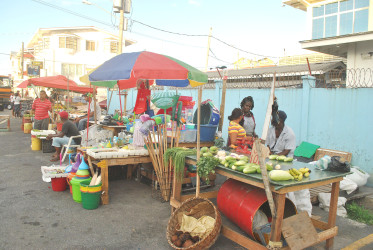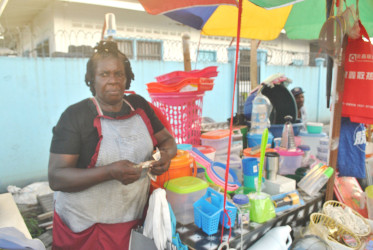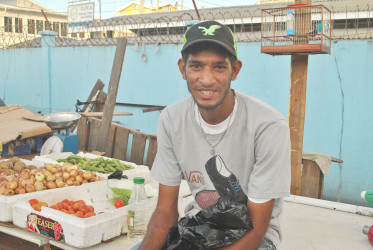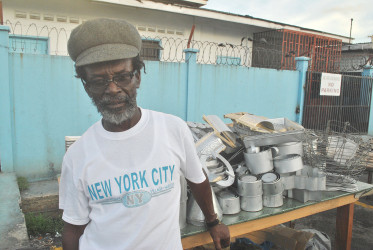The newest tenants of Orange Walk say they feel more than a trifle betrayed by the Georgetown Municipality, insistent as they are that they were promised that their original vending spots situated roughly on the corners of Robb and Bourda streets would be restored to them once the ancient Bedford Methodist school had been torn down.

Their move to the far less commercially attractive location on Orange Walk had been preceded by controversy that had reached the stage of noisy demonstrations and their near forced removal. Their relocation had proceeded in acrimony.
Two weeks after the rotting structure that was once one of the better-known urban primary schools was torn down and much of the rubble carted off, the relocation of the vendors is simply not on the municipality’s agenda. City Hall has confirmed that the land has been bought by an investor and that he has taken the precaution of filing an injunction prohibiting trading on the original spot where the vendors used to be and on the nearby roadway. A plan has already been submitted to the City Engineer’s Officer for the creation of a Fast Food establishment.
On Tuesday evening when the Stabroek Business visited the Bourda Market area the City Constabulary had reportedly only just removed two vendors who had been trading on the roadway close to the empty lot.
Tuesday’s brisk unexpected downpour had turned the actual spot on which vendors used to trade into an ugly cesspool. Still, the steady movement of traffic east along Robb Street, between Alexander Street and Orange Walk provided a poignant reminder of the vendors’ almost inevitable loss of patronage.

By contrast, the Orange Walk option is a far quieter stretch of road which offers decidedly less trading opportunity. On Tuesday evening half a dozen or so women were trading on the stretch between Robb and Regent streets; and they were brooding.
“It seems that we can’t go back to Bourda Street. We have heard about the injunction. It also seems that the Town Clerk has amnesia. He promised that we would go back; now he says he never did,” Desiree Wolfe, one of the vendors declared. She said that after several years of honest trading they are being made to feel like illegal traders. She volunteered to produce rent receipts dating back to the 1970s. Reflecting on the times when now long deceased councillors—including former government minister Claude Merriman—used to be active in municipal affairs, Desiree said those were days when the municipality was mindful of the welfare of the vendors.
Heeralall Singh and his grandmother hail from La Grange. They had been trading on Bourda Street for several years. On Tuesday he was trading alone. His grandmother was unwell. Business, he said, had been slow for some while and the move from Bourda Street to Orange Walk had made matters worse. On Bourda Street he would sell four or five bags of boulanger and four hundred head of pakchoi in a day. On Orange Walk the volume of trading had been reduced to one bag of boulanger and one hundred head of pakchoi daily. Discarding spoilt vegetables has now become commonplace. On Tuesday, as darkness fell, he was offering seven cucumbers for $100. His total sales for the day had just about reached $2,000 and the cost of his return fare to La Grange was $3,000.

At the old trading site things used to be different. Facilities there included a secure facility of sorts where goods could be stored overnight. These days, storage space for Desiree’s goods is provided through the kindness of one of the coconut vendors trading on the western half of Orange Walk.
There are other downsides to trading on Orange Walk. At the old vending venue business tended to pick up after 6 pm; frequently, the vendors would trade throughout the night. These days, the trading day ends around 7 pm. Both Desiree and Heeralall believe that it is unsafe to trade on Orange Walk any later in the night.
Stabroek Business had arrived at the Orange Walk vending spot a few minutes past 5 pm. An hour into our discourse

with the vendors, no more than five purchases had been made. That would not have been the case at the old site.
It appears too, that during the trading day there are sometimes disagreements with vehicle owners who are parking to make deliveries inside the market. The vendors accuse City Hall of making a hasty arrangement that puts them at odds with the vehicle owners. On Tuesday, Heeralall was even more upset over the fact that the rains had come and drenched him. He no longer benefits from a covered stall.
On Tuesday, Emily Williams was offering fruit and vegetables from her stall on Orange Walk. She has been vending for the past 20 years and takes a philosophical view of the present fluid situation. She refuses to worry.
If the stories of the displaced vendors are anything to go by, a profound lack of trust appears to have developed between the vendors and the municipality. Desiree Wolfe said that when the issue of relocation was being discussed the Council had undertaken to assist in the removal of the stalls to Orange Walk. She said they waited for two days for the promise to be kept. Eventually, the stalls had been torn down and some goods destroyed. She said, too, that the relocated vendors were required to meet the cost of transportation to move to Orange Walk tables and picnic umbrellas (for shade from the sun) given to them by the municipality.
The lone vendor trading on Bourda Street close to the now vacant lot on Tuesday evening, said her name was Mrs Jones. She said her husband and business partner of decades had succumbed to high blood pressure in August of this year. She believed that “the situation” (the problems associated with re-location) had killed him. Up to the time of his death Ivor Jones was selling slippers and other items close to the Bedford School. After they had been relocated along with the other vendors Mrs Jones would return to the spot in the evenings. Last Thursday they were informed that the developer had filed an injunction which would prevent them from selling on the spot or on the road in front of the now destroyed building.
Mrs Jones lives in East La Penitence and these days she asks fellow vendors to store her goods for the night. There are days on which she sells nothing.
The vendors believe that they are witnessing a change in the traditional trading culture in municipal spaces. They believe that the space left vacant by the demolition of what was once the Bedford Methodist School will be filled by some massive, modern building that will become part of the contemporary high-rise trading culture. Still, they are hoping that they can “do a deal” with City Hall which has already said that its own preoccupation is with modernizing Georgetown.





